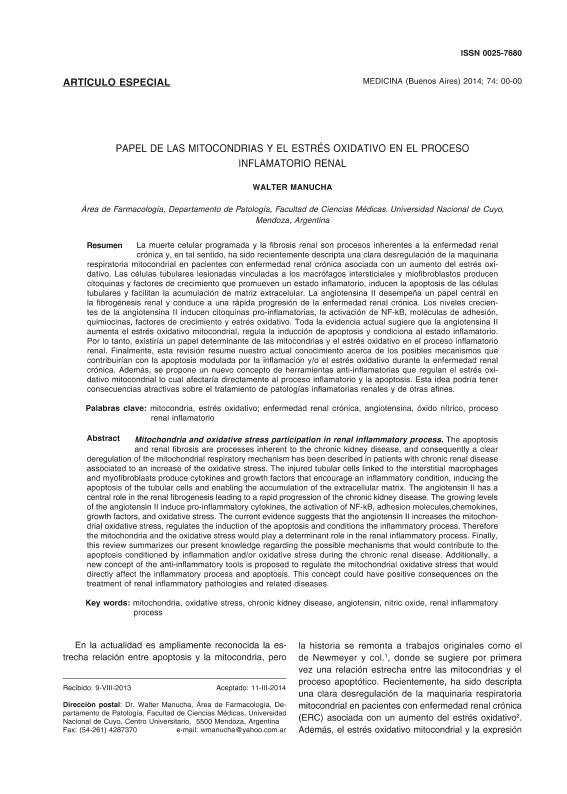Artículo
La muerte celular programada y fibrosis renal son procesos inherentes a la enfermedad renal crónica, y en tal sentido ha sido recientemente descripto, una clara desregulación de la maquinaria respiratoria mitocondrial en pacientes con enfermedad renal crónica asociada con un aumento del estrés oxidativo. Las células tubulares lesionadas vinculadas a los macrófagos intersticiales, y miofibroblastos producen citoquinas y factores de crecimiento que promueven un estado inflamatorio, inducen la apoptosis de las células tubulares y facilitan la acumulación de matriz extracelular. La angiotensina II desempeña un papel central en la fibrogénesis renal y conduce a una rápida progresión de la enfermedad renal crónica. Los niveles crecientes de la angiotensina II inducen citoquinas pro-inflamatorias, la activación de NF-kB, moléculas de adhesión, quimiocinas, factores de crecimiento, y el estrés oxidativo. Toda la evidencia actual sugiere que angiotensina II aumenta el estrés oxidativo mitocondrial, regula la inducción de apoptosis y condiciona al estado inflamatorio. Por lo tanto, existiría un papel determinante de las mitocondrias y el estrés oxidativo en el proceso inflamatorio renal. Finalmente, esta revisión resume nuestro actual conocimiento acerca de los posibles mecanismos que contribuirían con la apoptosis modulada por la inflamación y/o el estrés oxidativo durante la enfermedad renal crónica. Además, se propone un nuevo concepto de herramientas anti-inflamatorias que regulan el estrés oxidativo mitocondrial lo cual afectaría directamente al proceso inflamatorio y la apoptosis. Esta idea podría tener consecuencias atractivas sobre el tratamiento de patologías inflamatorias renales y de otras afines. Mitochondria and oxidative stress participation in renal inflammatory process. The apoptosis and renal fibrosis are processes inherent to the chronic kidney disease, and consequently a clear deregulation of the mitochondrial respiratory mechanism has been described in patients with chronic renal disease associated to an increase of the oxidative stress. The injured tubular cells linked to the interstitial macrophages and myofibroblasts produce cytokines and growth factors that encourage an inflammatory condition, inducing the apoptosis of the tubular cells and enabling the accumulation of the extracellular matrix. The angiotensin II has a central role in the renal fibrogenesis leading to a rapid progression of the chronic kidney disease. The growing levels of the angiotensin II induce pro-inflammatory cytokines, the activation of NF-kB, adhesion molecules,chemokines, growth factors, and oxidative stress. The current evidence suggests that the angiotensin II increases the mitochondrial oxidative stress, regulates the induction of the apoptosis and conditions the inflammatory process. Therefore the mitochondria and the oxidative stress would play a determinant role in the renal inflammatory process. Finally, this review summarizes our present knowledge regarding the possible mechanisms that would contribute to the apoptosis conditioned by inflammation and/or oxidative stress during the chronic renal disease. Additionally, a new concept of the anti-inflammatory tools is proposed to regulate the mitochondrial oxidative stress that would directly affect the inflammatory process and apoptosis. This concept could have positive consequences on the treatment of renal inflammatory pathologies and related diseases.
Mitochondria and oxidative stress participation in renal inflammatory process
Título:
Mitochondria and oxidative stress participation in renal inflammatory process
Fecha de publicación:
06/2014
Editorial:
Medicina (buenos Aires)
Revista:
Medicina (buenos Aires)
ISSN:
0025-7680
e-ISSN:
1669-9106
Idioma:
Español
Tipo de recurso:
Artículo publicado
Clasificación temática:
Resumen
Archivos asociados
Licencia
Identificadores
Colecciones
Articulos(IMBECU)
Articulos de INST. DE MEDICINA Y BIO. EXP. DE CUYO
Articulos de INST. DE MEDICINA Y BIO. EXP. DE CUYO
Citación
Manucha, Walter Ariel Fernando; Mitochondria and oxidative stress participation in renal inflammatory process; Medicina (buenos Aires); Medicina (buenos Aires); 74; 3; 6-2014; 254-258
Compartir




